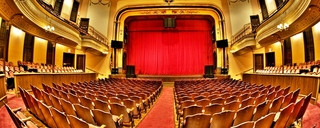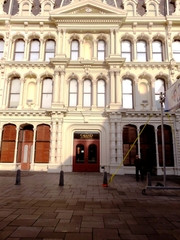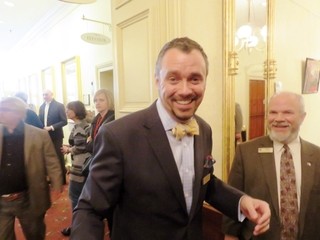|
Back
Grand Opera in a Tiny State
05/18/2016

Grand Opera House (© Courtesy of Grand Opera House)
Like most of their breed, my dentist has a corrosive sense of humor. Telling him that I had returned from a trip to the Delaware Opera Festival, he expressed amazement, said, “Open wide”, and then continued:
“What’s the difference between yoghurt and the State of Delaware?”
“Agggh,” I replied, mouth still agape.
“Only one of them,” he laughed, “is a Living Culture. Keep your mouth open.”
“Agggh!” I replied.
One might also ask the difference between American cities and practically every town in Europe. European opera houses blossom out like tulips in Holland. In America, municipal politics virtually damns any support for living culture: concert hall, opera houses, even museums.
Delaware, though, might be the exception.
How does OperaDelaware work? For seventy-one years, the company has done quite well in the state’s largest city, Wilmington. True enough, that isn’t saying much compared to the metropolises of New York, Chicago and San Francisco. Wilmington itself has a population of barely 70,000, about equally divided between Caucasians and African-Africans. And Delaware itself, while priding itself on its early American history, is the country’s second smallest state with less than a million souls.
Even more depressing is that Delaware is edged in amongst Maryland, Virginia and Washington D.C., with little personality of its own to the outside world. Except in the negative sense. Said an acquaintance who had moved up from Mississippi to teach engineering at the local college, “The great thing about Delaware is that nobody gets excited about things. We have equanimity. Politically, the southern half of the state is conservative, Wilmington is probably moderately liberal. But after 12 years of living here, I’ve never heard a political argument...or an argument of any size.”
We were strolling through Brandywine Park, designed by the same landscape architect who did New York’s Central Park. And he admitted that he had never been to OperaDelaware’s productions. He had wanted to, but...well, he just didn’t know if it were up to his standards.
After two performances, I think he was wrong. The pair of productions varied in quality of the music, the orchestra (a tiny one, with mainly members of the Delaware Symphony Orchestra) was decent, but Delaware has no James Levine to lead them. Yet the audience was enthusiastic enough, the productions were stylish enough.
Naturally, OperaDelaware cannot support itself with merely an audience in the 1,208-seat theater. They have some municipal support, yet the great balance of their funds come from those stalwarts of the Delaware economy, the DuPont family.
For over three-hundred years, since they started their munitions business around the War for Independence, the DuPonts have supported virtually everything Delawarian, especially in the Culture Business.
Take New Castle, a town just a few miles north of Wilmington. About 80 years ago, the Rockefeller Foundation wanted to “buy” their original settlement of “Old Castle” on the sea, keeping the architectural treasures but evicting its residents. New Castle rebelled, the Rockefellers got angry, and they went south to Williamsburg, Virginia for their reproductions.
What happened to Old Castle? Typical. A few years later, one of the DuPonts put in money to resurrect these lovely buildings–but people would be allowed to stay.
And what happens when DelawareOpera is going bankrupt? Again, an influx of money, mainly from the monied families, keeps OperaDelaware afloat.

Ext. Grand Opera House (© Samuel A. Dog)
Their venue is a delicious-looking four-storey opera house right in the middle of commercial Market Street. Amidst a plethora of Chinese, Italian and Indian restaurants, next to the museum (which is temporarily closed), and a few blocks from Orange Street, the “offshore” area of America’s billionaires, The Grand Opera House was founded in 1871. Not as a theater per se but the Grand Masonic Hall (or Lodge).
The cost of (what Wilmingonians call “The Grand Old Lady of Market Street”) was a lordly $100,000. Those days, America thrived on these cults, loved traveling actors and speakers, and was ready to welcome the most variegated artists to their stages.
Thus the Grand Masonic Lodge, with its arcane paintings on the ceiling, its Classical Greek. Second Empire exterior, and their fine sound system, welcomed such stars of a bygone era as Ethel Barrymore, John Philip Sousa and Buffalo Bill Cody. (They also have a portrait of Sarah Bernhardt, who may have appeared here.)
The Masons needed money to support the building, to their first season included 70 performances, with tickets going at $1.00 per seat. (A box, seating four, would go for $5.00). Over the next century, it was a necessary stop for vaudeville performers, who would start in Washington, DC, going down to Baltimore, than Wilmington, then the Deep South.
In 1967, though, the building was in need of repairs–and four years later, they opened again, this time with the OperaDelaware.
Today, OperaDelaware has only two full-scale operas a year, but the evenings have star speakers, like Garrison Keilor, musicians of every genre and speakers.
OperaDelaware is, to say the least, a shoestring operation. This writer was amazed to find that, when trying to locate the Public Relations Manager, I was turned onto the General Manager, Brendan Cooke, who–oh, will miracles ever cease??–answered his own phone. (New Yorkers would never believe that.)

B. Cooke (© Samuel A. Dog)
A singer himself, the amiable General Director was appointed to OperaDelaware in June 2012. He is no prima donna either. Upon coming on stage before the opening Amleto, he was greeted like a football star, his name in Wilmington is greeted with big smiles and appreciation, and he obviously wants to build the company up.
“We started in 1945,” he said, “because one citizen, Chick Laird, had the idea of a local company. We had this jewel-box of an opera house, we had potential audiences from Maryland and Delaware, and we could use the musicians from the local orchestras and choral and ballet groups, like we did this year.
“And what we didn’t want to do was imitate companies around us with another Bohème, another Butterfly. Which is why we have Amleto and Falstaff this year.”
Honorable as this is, the Opening Night had, with their enthusiastic audiences, plenty of empty seats. Falstaff the next afternoon, was hardly filled either, though thankfully many in the audience had brought their children.
“That could be because OperaDelaware has an Outreach program. We go to the schools, we introduce them to music.
“Even more important, OperaDelaware, with its local crew, musicians and choruses, has to appeal to the cities around us. Philadelphia is in our neighborhood, as is Baltimore, as is all of Delaware. Even, this year, a reviewer from New York (you, Harry) and another reviewer from Paris.”
This was true. I was wandering up Market Street when a nice elderly couple approached and asked where the Opera House was. We talked, and they mentioned that Falstaff was the very first opera they had ever seen in their lives.
“We were always afraid to go,” said the lady, “because we thought opera was all about everybody dying at the end.”
“That,” I said, “was last night’s Amleto. You are lucky indeed. Falstaff has a few drunkards, but not a single dead body.”
I believe they were assuaged, and I know they enjoyed this production.
With this year’s festival, Brendan Cooke is ready to go onto more expansive productions in 2017. Though plans are not released yet, he feels that “America’s 11th Oldest Opera Company” is a going concern.
“Most of our singers, like a good part of our audience, comes from out of town. But our designers, our crew, our choruses, our orchestra are right here in Wilmington. So tell that dentist of yours that, unlike his yoghurt, we not only have a living culture, but our work and a future planned to be far outside the box”.
Harry Rolnick
|